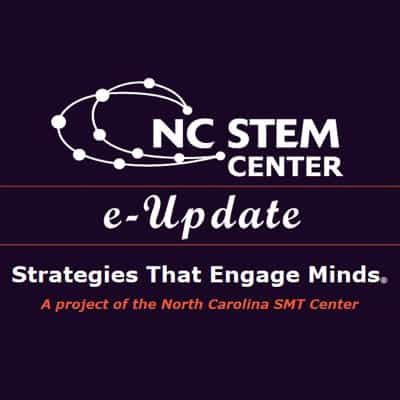
“My background in STEM is going to give me a leg up in my future career.”
– Mackenzie Lamb, 10th grader
Wake NCSU STEM Early College High School
What is STEM?
STEM stands for science, technology, engineering, and mathematics. The NC Science, Mathematics, and Technology (SMT) Center elaborates:
Science is the study of the natural world, including the laws of nature associated with physics, chemistry, and biology and the treatment or application of facts, principles, concepts, or conventions associated with these disciplines.
Technology comprises the entire system of people and organizations, knowledge, processes, and devices that go into creating and operating technological artifacts, as well as the artifacts themselves.
Engineering is a body of knowledge about the design and creation of products and processes for solving problems. Engineering utilizes concepts in science and mathematics and as well as technological tools.
Mathematics is the study of patterns and relationships among quantities, numbers, and shapes. Mathematics includes theoretical mathematics and applied mathematics.1
A comprehensive education in STEM includes interdisciplinary knowledge where STEM concepts are applied to real-world problems. STEM education is well supplemented with self-directed learning through enrichment experiences like after-school programs, outdoor education, and field trips to museums, zoos, and aquariums.
Not only is it important for students to gain this skill set in order to be ready for the future, but it is also important for North Carolina’s own future as a hub of technological innovation.
The goal of STEM education is to provide students with the skills they need to thrive in the changing 21st century workforce. Technology is pervasive in our society these days, and there are few careers that don’t require the critical thinking that comes along with STEM learning.
Not only is it important for students to gain this skill set in order to be ready for the future, but it is also important for North Carolina’s own future as a hub of technological innovation. All communities across the state need to grow and retain a well-trained workforce in order to thrive – both economically and socially.
North Carolina has a strong economic past, present, and future with many large companies investing in our state. Bank of America, Burts Bees, Deere-Hitachi, GlaxoSmithKline, Hanes, LabCorp, Lowe’s, Martin Marietta Materials, Quintiles, Red Hat, and SAS Institute are just a few of the major corporations with headquarters in North Carolina. That doesn’t even begin to scratch the surface when you count other large companies with an important presence in the state – companies like Apple, Biogen, Caterpillar, Cisco, Facebook, Google, IBM, Lenovo, and Merck.
The main thing these companies need in order to stay invested in our state? A constantly growing workforce that is well-educated in science, technology, engineering, and mathematics.
Enter STEM education.
Where does STEM education stand in NC?
I will be taking a closer look at this question throughout the next year in my new column “Sparking STEM.”
For now, there are a few places we can look.
The NC Science, Mathematics, and Technology (SMT) Center is a nonprofit organization with the goal of improving education as a means to provide opportunities for all students in North Carolina to gain the knowledge and skills in order to thrive in successful careers and advance the state economy. They developed the NC STEM ScoreCard, which provides a comprehensive look at where North Carolina stands in terms of its STEM-related economic future.
The NC State Board of Education and the Department of Public Instruction have developed the NC STEM Education Strategic Plan, which outlines the priorities and strategies for improving STEM education in North Carolina.
There are a growing number of initiatives and schools across the state focused on STEM education.
The Kenan Fellows Program for Curriculum and Leadership Development was established in 2000 by the Kenan Institute for Engineering, Technology & Science at NC State University. Their mission is to improve K-12 STEM education by providing leadership development for teachers across the state through collaborations with partners in industry, higher education, and government. The outstanding teachers who are selected as Kenan Fellows participate in a five-week summer research experience along with a two-week professional development intensive experience. Their fellowship is year long, during which they partner with university researchers and industry experts. The skills and experiences these teachers gain are transferred to their classrooms through a highly enriched curriculum.
The North Carolina School of Science and Mathematics (NCSSM) is the nation’s first public residential high school focusing on STEM education. It was established in 1978 with the first class starting in 1980. NCSSM is free for any legal resident of North Carolina. High school sophomores must apply to the two-year program that takes place during their junior and senior years of high school. Students accepted into the residential program live on the historic Durham campus. NCSSM also has distance education and outreach programs.
The North Carolina New Schools initiative started in 2003 and currently composes a network of over 120 high-performing high schools all across the state. Since 2007, they have helped create nearly 40 STEM-themed high schools, in addition to providing STEM-focused curriculum and training to all other partner schools.
The State Board of Education and the Department of Public Instruction recognize a selection of public elementary, middle, and high schools for demonstrating outstanding leadership and instruction in STEM education. The schools currently receiving the honor of being chosen as STEM Exemplary Schools are:
Elementary school:
- Brentwood Magnet Elementary School of Engineering, Wake County
Middle schools:
- Elkin Middle School, Elkin City Schools
- Exploris Charter Middle School, Wake County (Model status)
- Hanes Magnet Middle School, Winston-Salem/Forsyth Schools
- Sam Gentry Middle School, Surry County
- Fries Magnet Middle School, Cabarrus County
K-8 school:
- Contentnea-Savannah K-8 School, Lenoir County
High schools:
- Atkins Academic & Technology High School, Winston-Salem/Forsyth Schools
- Brunswick County Early College High School, Brunswick County
- Greene Central High School, Greene County
- STEM Early College NC A&T, Guilford County
- Wayne School of Engineering at Goldsboro High School, Wayne County
STEM education is becoming more and more critical, especially in North Carolina. This growing need is recognized by education leaders, schools, and many businesses across the state. The NC SMT Center says that STEM education is about more than just science, technology, engineering, and mathematics…
It is about strategies that engage minds.
I like this perspective, as it is a reminder that in order for education to stick, it must be engaging.
I invite you to join me on my exploration into STEM education in North Carolina. We will go inside schools that are a model of excellence, take a look at the impact of STEM education in communities across the state, and explore resources, initiatives, outreach programs, clubs, and extracurricular activities that provide engaging, enriching STEM experiences to all students in North Carolina.
Editor’s Note: Sam Houston, the president and CEO of the North Carolina Science, Mathematics, and Technology Education Center, also is on the Board of Directors of EdNC.

